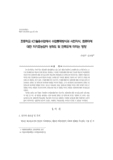

PARTNER
검증된 파트너 제휴사 자료
초등학교 ICT활용수업에서 수업통제방식과 사전지식, 컴퓨터에 대한 자기효능감이 성취도 및 만족도에 미치는 영향
24 페이지
최초등록일 2015.03.25
최종저작일
2004.12

-
 * 본 문서는 배포용으로 복사 및 편집이 불가합니다.
* 본 문서는 배포용으로 복사 및 편집이 불가합니다.
미리보기
서지정보
· 발행기관 : 이화여자대학교 교과교육연구소
· 수록지 정보 : 교과교육학연구 / 8권 / 2호
· 저자명 : 주영주, 문자영
목차
I. 서 론
II. 이론적 배경
III. 연구 방법
IV. 연구 결과
V. 결론 및 제언
참고문헌
초록
본 연구에서는 이미 학교 현장에서 활성화되고 있는 ICT 활용수업에서 고려해야 할 교수방식으로 교
수자 통제방식과 학습자 통제 방식을 설정하고, 이러한 수업통제방식에 따라 주요한 학습자 특성변인인
사전지식과 컴퓨터에 대한 자기효능감이 학습자의 학업성취 및 만족도에 미치게 되는 영향이 어떻게 달
라지는지를 검증해 봄으로써 학습자 특성을 고려한 ICT 자료를 활용한 수업의 교수 전략 및 지침을 제
공하고자 하였다. 연구 결과, 수업통제방식과 사전지식, 수업통제방식과 컴퓨터에 대한 자기효능감의 상
호작용은 성취도 및 만족도에 유의미한 영향을 미치지 못했고, 오직 세 변인의 상호작용만이 성취도 및
만족도에 유의미한 영향을 미치는 것으로 나타났다. 또한, 성취도에 영향을 미치는 변인 중에서 가장 큰
영향을 미치는 변인은 사전지식이며, 만족도에 가장 큰 영향을 미치는 변인은 컴퓨터에 대한 자기효능감
이었다.
이러한 결과는 ICT 활용 수업에서 수업통제방식과 사전지식, 컴퓨터에 대한 자기효능감의 상호작용
이 이들 중 어느 한 변인을 제거하는 것과 비교해 성취도 및 만족도에 미치는 영향이 더 크다는 것을
보여줌으로써, 컴퓨터와 학습상황, 학습자의 특성 등을 포함하는 다양한 요인들에 대한 복합적인 고려가
없이 이루어지는 집합적인 ICT의 도입은 기대하는 학습효과를 가져오지 못할 수 있음을 시사한다.영어초록
The purpose of this study is to explore the relationship between learner characteristics(prior
knowledge, computer self-efficacy) andachievement andsatisfaction inanenvironmentwhere ICTis
applied to different instructional controls(instructor control, learner control). The idea which
supports the rationale of this study could be drawn either fromJonassen(1999) or Kozma(1994)who
emphasized the role of the learner itself for learning to take place in ICT environments. To this
purpose the following research questionswere investigated:
The results of this studywere summarized as follows:
First, there was a significant statistical correlation between prior knowledge and computer
self-efficay, r(66) = .448,p < .01. Instructional control, themain treatment of this study, however, had
no significant statistical correlation with any other variances(p > .05). Specially, Prior knowledge
showed strongest interaction with achievement, r(66) = .569, p < .01, while computer self-efficacy
showed strongest interactionwith satisfaction, r(66) = .489,p < .01.
Second, there was little significant statistical differences between prior knowledge and
instructional control, and computer self-efficacy and instructional control. Instead, interaction of all
three variances had significant statistical differences in achievement(β= .277,p < .05). However, this
interactionwas less effective than each variance- prior knowledge, computer self-efficacy that affect
the achievement.
Third, except interaction of all three variances(β= .323, p < .05), there was little significant
statistical differences between prior knowledge and instructional control, and computer self-efficacy
and instructional control, as same as second result.
It could be inferred fromthe results of the study that the interaction of various variances including
instructional control, prior knowledge, and computer self-efficacy can affect the achievement or
satisfaction. As the existing research results showed, there are various results according which
variables are considered.Also, based upon these results, onemay rightly argue that the instructional
designprocessmust include alternative strategies inwhich thenature of the task is takeninto account
at different learner characteristics.참고자료
· 없음태그
-
자료후기
-
자주묻는질문의 답변을 확인해 주세요

꼭 알아주세요
-
본 학술논문은 (주)학지사와 각 학회간에 저작권계약이 체결된 것으로 AgentSoft가 제공 하고 있습니다.
본 저작물을 불법적으로 이용시는 법적인 제재가 가해질 수 있습니다. -
해피캠퍼스는 구매자와 판매자 모두가 만족하는 서비스가 되도록 노력하고 있으며, 아래의 4가지 자료환불 조건을 꼭 확인해주시기 바랍니다.
파일오류 중복자료 저작권 없음 설명과 실제 내용 불일치 파일의 다운로드가 제대로 되지 않거나 파일형식에 맞는 프로그램으로 정상 작동하지 않는 경우 다른 자료와 70% 이상 내용이 일치하는 경우 (중복임을 확인할 수 있는 근거 필요함) 인터넷의 다른 사이트, 연구기관, 학교, 서적 등의 자료를 도용한 경우 자료의 설명과 실제 자료의 내용이 일치하지 않는 경우
“교과교육학연구”의 다른 논문도 확인해 보세요!
-
전래동화를 활용한 문학 활동이 아동의 상상 기능 및 성향에 미치는 영향 18 페이지
본 연구는 전래동화를 활용한 문학 활동이 아동의 상상 기능 및 상상 성향에 미치는 영향을 알아보는 데 목적이 있다. 이를 위해 관련 문헌을 기초로 하여 제7차 교육과정에서 제시된 전래동화를 중심으로 하는 문학 활동을 재구성 하였다. 재구성하여 개발된 활동들은 초등학교 3학년 한 학급을 사례집단으로 선정하여 8주간 실험을 하였다. 연구 결과, 전래동화를.. -
유아의 음악선호도 조사 18 페이지
본 연구는 유아들의 음악선호도와 그 선호도에 영향을 미치는 요인들을 파악하는데 그 목적이 있다. 이를 위하여 서울의 한 사립유치원에 재학 중인 전 원생 131명과 그 학부모를 대상으로, 유아들에게는 4가지 장르(동요, 전래동요, 클래식, TV 만화 주제가 및 광고음악)의 음악을 들려주고 즉각적인 반응을 측정하는 음악선호도 검사를, 학부모들에게는 설문지.. -
중ㆍ고등학생 및 대학생들의 음악양식에 대한 선호도 25 페이지
본 연구는 중ㆍ고등학생 및 대학생들의 음악양식에 대한 선호도를 파악하고 그 선호도에 미치는 연 령,성별 그리고 곡에 대한 친숙도 요인들의 영향을 파악하는데 그 목적이 있다. 이를 위하여 서울의 중ㆍ 고등학생 및 대학생 810명(중학생 303명, 고등학생, 284명, 대학생 223명)을 대상으로 5가지 음악양식 (서양 클래식, 한국 대중음악, 재즈, 국.. -
漢字를 통한 중국문화교육에 관한 제언 12 페이지
본고는 기존의 한자 학습방식에서 탈피하여, 漢字가 중국 역사문화의 ‘활화석’이라는 사실에서 출 발하여 漢字가 담아내고 있는 중국의 문화적 내용을 소개함으로써 학습자들로 하여금 漢字를 쉽고도 재 미있게 이해시키는 방안을 제시하고자 한다. 이러한 방안은 학습자들의 한자에 대한 흥미를 유발할 수 있을 뿐만 아니라 중국인의 사유방식과 사상, 그리고 문화를 이.. -
영화를 활용한 주제중심 역사수업 모형 개발 및 적용 방안 16 페이지
본 연구의 목적은 영화를 활용한 주제 중심 역사 수업의 모형을 개발하고 학교 현장에서 실질적으로 활용할 수 있는 방안을 모색하고 제시하는데 있다. 본 연구를 위해서 전쟁으로 역사 읽기라는 주제 하에 영화 <헨리 5세>와 <패트리어트>를 선정하여 학기말에 수업을 실시하여 그 유용성을 검증하였다. 그 결과 영화를 활용한 주제 중심 역사 학습은 학생들로 하..
문서 초안을 생성해주는 EasyAI
